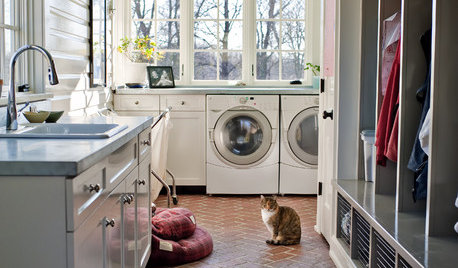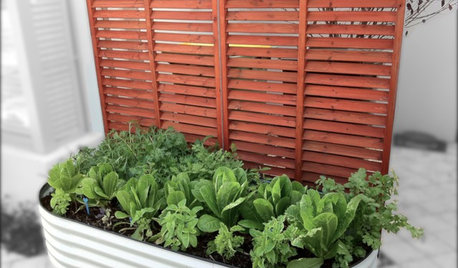Sorry for the 'rant'. More substance here. Noisy fridge.
svejkovat
11 years ago
Related Stories

KITCHEN DESIGNSurvey Results: Kitchen Trends That Seem Here to Stay
More than a third of respondents in Houzz’s annual kitchen trends report now have the means to remodel. Here’s what else they told us
Full Story
MOVING10 Rooms That Show You Don’t Need to Move to Get More Space
Daydreaming about moving or expanding but not sure if it’s practical right now? Consider these alternatives
Full Story
LAUNDRY ROOMSGet More From a Multipurpose Laundry Room
Laundry plus bill paying? Sign us up. Plus a potting area? We dig it. See how multiuse laundry rooms work harder and smarter for you
Full Story
KITCHEN COUNTERTOPSKitchen Countertop Materials: 5 More Great Alternatives to Granite
Get a delightfully different look for your kitchen counters with lesser-known materials for a wide range of budgets
Full Story
FEEL-GOOD HOME21 Ways to Waste Less at Home
Whether it's herbs rotting in the fridge or clothes that never get worn, most of us waste too much. Here are ways to make a change
Full Story
GREEN BUILDINGThe Big Freeze: Inventors Break New Ground to Keep Things Cool
Old-fashioned fridges can be energy guzzlers, but there are more eco-friendly ways of keeping food fresh, as these global innovations show
Full Story
HOME OFFICESQuiet, Please! How to Cut Noise Pollution at Home
Leaf blowers, trucks or noisy neighbors driving you berserk? These sound-reduction strategies can help you hush things up
Full Story
KITCHEN DESIGNSee-Through Refrigerators Dare to Go Bare
Glass-front fridge doors put your food and drinks on display, for better or worse. See the benefits and disadvantages
Full Story
GARDENING GUIDESBackyard Birds: Invite Entertaining Hummingbirds Into Your Garden
Hummingbirds — unique to the Americas — zip through open landscapes seasonally or year-round. Here’s how to attract them
Full Story
HEALTHY HOMEHow to Childproof Your Kitchen
Knives, cords and chemicals can be a recipe for disaster around babies. Here’s how to make your kitchen safer for kids
Full StoryMore Discussions



mike_home
svejkovatOriginal Author
Related Professionals
Dracut Solar Energy Systems · Fort Lee Solar Energy Systems · Norwich Solar Energy Systems · Palo Alto Solar Energy Systems · Rockledge Solar Energy Systems · Tarpon Springs Solar Energy Systems · Waltham Solar Energy Systems · Castle Rock Home Automation & Home Media · Pittsburgh Home Automation & Home Media · Scottsdale Home Automation & Home Media · Dedham Electricians · Lancaster Fireplaces · Quincy Fireplaces · Tooele Fireplaces · Crestwood Fireplaceskalining
Elmer J Fudd
kalining
cindywhitall
svejkovatOriginal Author
brickeyee
weedmeister
brickeyee